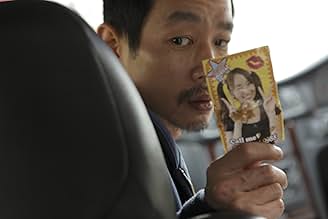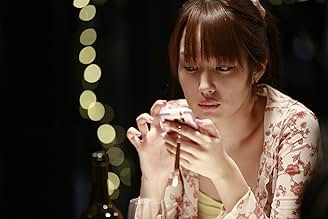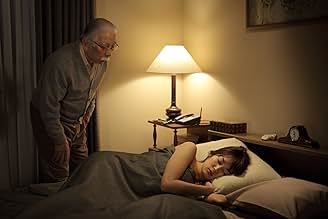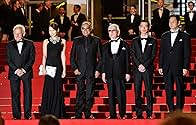ÉVALUATION IMDb
7,0/10
14 k
MA NOTE
Ajouter une intrigue dans votre langueIn Tokyo, a young sex worker develops an unexpected connection with a widower over a period of two days.In Tokyo, a young sex worker develops an unexpected connection with a widower over a period of two days.In Tokyo, a young sex worker develops an unexpected connection with a widower over a period of two days.
- Director
- Writers
- Stars
- Prix
- 1 victoire et 6 nominations au total
Kôichi Ôhori
- Taxi Driver
- (as Kouichi Ohori)
Ryota Nakanishi
- Student
- (uncredited)
Avis en vedette
The great Iranian director Abbas Kiarostami made "Like Someone In Love" in Japan but it could have been set anywhere for this is a film that knows no boundaries or borders. As you would expect from Kiarostami it's brilliantly written and directed and beautifully played, particularly by Tadashi Okuno as an old professor whose loneliness draws him to a young student supplementing her income by working as an escort. He's not looking for sex, just conversation and company and when, the next day, they run into her jealous boyfriend the old man allows himself to be mistaken for her grandfather ... and then the boy finds out the truth.
It's a film of mostly small dramas and when violence finally erupts Kiarostami keeps it off screen. For the most part these people simply talk, about their problems, their relationships and life itself and Kiarostami films sequences in 'real time' and with a fixed camera just as he does in his Iranian films. I found it mesmerizing, at times funny, sometimes moving and in the end, really rather shocking. It makes for essential viewing.
It's a film of mostly small dramas and when violence finally erupts Kiarostami keeps it off screen. For the most part these people simply talk, about their problems, their relationships and life itself and Kiarostami films sequences in 'real time' and with a fixed camera just as he does in his Iranian films. I found it mesmerizing, at times funny, sometimes moving and in the end, really rather shocking. It makes for essential viewing.
Kiarostami in Japan, what bliss and promise! I'm always interested when foreign filmmakers film in Japan, how that worldview illuminates them. Chris Marker captured the most evocative coming and going of things in Sans Soleil, on the flipside for me is Wenders who completely misses Zen in his film about Ozu, mistaking emptiness for modern lack. Coppola's is merely passable for my taste.
But Kiarostami is not merely drawn to images, his whole world conveys a Persian Zen of sorts—his Wind was the most clear, all about finding meaning in things and their cyclical drift being what they are. Certified Copy added more story, but the fact remained of his being the most essentially Buddhist filmmaker in the West since Antonioni, drawing up the same realizations about self and time.
So what does he find here, what illumination?
There are three main implications woven together, all derived from a Buddhist view; the transience of things, with people coming and going at the bar before the girl, the taxi drive with Tokyo nightlife fleeing past, circling around the grandmother but driving on without stopping; illusory self, we are not sure at first who the girl or the old man are, no fixed roles but two people in each other's company, the resemblance to the girls in the painting and photograph, the old man posing as the grandfather later in the car and her flyer that comes up, all pointing to the fluidity of self; ignorance born from desire in the fiancé with his phonecalls and later showing up on the door.
Kiarostami captures the essence of Buddhism, not interpreting themes but unearthing the visual flow from ordinary life. He films the air of anticipation, the cautious exchange. True to Japan, he films the drama with no needless suffering, as awareness, with that faint melancholy they know over there as mono no aware, which comes from a notion of time where things are not inevitable as we understand in the West when we talk about fate, nor could they be anything else than what's before the eyes.
What will be will be, says the old man who poses as the grandfather to both protect the girl and conceal his misdeed. We have this wonderful ambiguity all through the thing. There is no problem of evil see in Buddhism and Kiarostami's cinema alike. No moral blame in that the girl does what she does to go through college and ignores her grandma, or that the old man desired the company of someone like her that night or even that he lies about being the grandfather.
But when what will be is finally at hand and the old man looks confused and foolish as he faces a beating, what's the good of all the philosophizing then? But that's when Kiarostami abandons the story, probably thinking he has evoked enough and we should mull over the rest.
I consider this a real miss, a poor ending. We don't need any concrete answer of course. It's just that ending it at that point in the story, with the karmic noise but not the echo back into life, we forget all about the girl, the sweet fragile self who is not the dolled-up face in the flyer, we forget about the waiting grandmother, it's all cleaved away from the film.
But Kiarostami is not merely drawn to images, his whole world conveys a Persian Zen of sorts—his Wind was the most clear, all about finding meaning in things and their cyclical drift being what they are. Certified Copy added more story, but the fact remained of his being the most essentially Buddhist filmmaker in the West since Antonioni, drawing up the same realizations about self and time.
So what does he find here, what illumination?
There are three main implications woven together, all derived from a Buddhist view; the transience of things, with people coming and going at the bar before the girl, the taxi drive with Tokyo nightlife fleeing past, circling around the grandmother but driving on without stopping; illusory self, we are not sure at first who the girl or the old man are, no fixed roles but two people in each other's company, the resemblance to the girls in the painting and photograph, the old man posing as the grandfather later in the car and her flyer that comes up, all pointing to the fluidity of self; ignorance born from desire in the fiancé with his phonecalls and later showing up on the door.
Kiarostami captures the essence of Buddhism, not interpreting themes but unearthing the visual flow from ordinary life. He films the air of anticipation, the cautious exchange. True to Japan, he films the drama with no needless suffering, as awareness, with that faint melancholy they know over there as mono no aware, which comes from a notion of time where things are not inevitable as we understand in the West when we talk about fate, nor could they be anything else than what's before the eyes.
What will be will be, says the old man who poses as the grandfather to both protect the girl and conceal his misdeed. We have this wonderful ambiguity all through the thing. There is no problem of evil see in Buddhism and Kiarostami's cinema alike. No moral blame in that the girl does what she does to go through college and ignores her grandma, or that the old man desired the company of someone like her that night or even that he lies about being the grandfather.
But when what will be is finally at hand and the old man looks confused and foolish as he faces a beating, what's the good of all the philosophizing then? But that's when Kiarostami abandons the story, probably thinking he has evoked enough and we should mull over the rest.
I consider this a real miss, a poor ending. We don't need any concrete answer of course. It's just that ending it at that point in the story, with the karmic noise but not the echo back into life, we forget all about the girl, the sweet fragile self who is not the dolled-up face in the flyer, we forget about the waiting grandmother, it's all cleaved away from the film.
This could have been a great film since all the necessary elements are already there. The viewers can feel that they are in expert hands but unfortunately, director Abbas Kiarostami's need to make the viewer appreciate his genius does not work in the film's favor. Take the first scene for instance. I was very annoyed that the camera work made me feel a dissonance between what I saw & what I heard. Perhaps in his clever way, the director was trying to hint that nothing is as it seems. I don't know what his intentions were but I didn't care for his tricks.
Anyway, moving on with the story, we surmise that the young & beautiful Akiko has a possessive & jealous boyfriend & is being forced by her boss/pimp into an difficult position that she's unable to get out of. The scene with her cab circling around her waiting grandma under the statue is so beautifully done that instantly my ambiguity towards Akiko vanished & I wanted this unhappy young woman to somehow find a way out of her predicament. The client is an old & retired academic who wanted to spend some time with Akiko. It is hinted that she bears a resemblance to his own granddaughter. She's however too exhausted to eat or talk, & goes straight to sleep. The old man lets her rest & in the morning drives her to the College so that she can appear for her exam. There he meets her fiance, Noriaki, who tries to come across as a decent young man. He mistakes the old man for Akiko's grandpa. Noriaki feels that he's in love with her but the wise old man can sense that all's not well between the young lovers & says that they are both too young to marry. Noriaki is nice enough to the old man but the latter can see that Noriaki is uncouth, has no interest in education & is chauvinistic to the point that he feels that once he marries Akiko, she would have to give in to all his demands. He has a low self esteem, is irrational, desperate, delusional, & obviously not the brightest bulb in the bunch. His fiancee has been avoiding him & he has his suspicions regarding Akiko's work but is unwilling to see the facts. However, when he is faced with the truth, he reacts in a very volatile manner. The viewer along with Akiko & 'grandpa' feel frustrated that more than anything else, her unfortunate liaison with this seemingly harmless but actually deranged & aggressive man may doom her life forever.
Anyway, moving on with the story, we surmise that the young & beautiful Akiko has a possessive & jealous boyfriend & is being forced by her boss/pimp into an difficult position that she's unable to get out of. The scene with her cab circling around her waiting grandma under the statue is so beautifully done that instantly my ambiguity towards Akiko vanished & I wanted this unhappy young woman to somehow find a way out of her predicament. The client is an old & retired academic who wanted to spend some time with Akiko. It is hinted that she bears a resemblance to his own granddaughter. She's however too exhausted to eat or talk, & goes straight to sleep. The old man lets her rest & in the morning drives her to the College so that she can appear for her exam. There he meets her fiance, Noriaki, who tries to come across as a decent young man. He mistakes the old man for Akiko's grandpa. Noriaki feels that he's in love with her but the wise old man can sense that all's not well between the young lovers & says that they are both too young to marry. Noriaki is nice enough to the old man but the latter can see that Noriaki is uncouth, has no interest in education & is chauvinistic to the point that he feels that once he marries Akiko, she would have to give in to all his demands. He has a low self esteem, is irrational, desperate, delusional, & obviously not the brightest bulb in the bunch. His fiancee has been avoiding him & he has his suspicions regarding Akiko's work but is unwilling to see the facts. However, when he is faced with the truth, he reacts in a very volatile manner. The viewer along with Akiko & 'grandpa' feel frustrated that more than anything else, her unfortunate liaison with this seemingly harmless but actually deranged & aggressive man may doom her life forever.
This is one of the very few good films I have watched in a while. This film is criticised for being simple, but Kiarostami's craft is almost flawless and very realistic. There are times when I questioned the duration of real-time in the film as he opt not to use jump cuts to show the shift in time, but except that minor glitch, this film was highly tense, deep and meaningful at so many levels.
Unlike the superficial Hollywood garbage we get to see everyday, Kiarostami's films show us real people with real problems. Probably one of the very few directors who can claim to have real class in this present era. I started watching this film after reading an interview with the director. The film did not disappoint me even a little bit. I am ashamed that I did not come across his name before.
Unlike the superficial Hollywood garbage we get to see everyday, Kiarostami's films show us real people with real problems. Probably one of the very few directors who can claim to have real class in this present era. I started watching this film after reading an interview with the director. The film did not disappoint me even a little bit. I am ashamed that I did not come across his name before.
In Tokyo, a young prostitute (Rin Takanashi) develops an unexpected connection with a widower (Tadashi Okuno) over a period of two days.
At this point in his career, Abbas Kiarostami had been directing films for forty years, so he is no amateur. But it might be a bit of a new beginning, filming in Tokyo with an all-Japanese cast. In fact, had one not known better, they might assume the director was Japanese. What do these two worldviews create when blended?
Professor Nico Baumbach makes much of this cultural difference (and rightfully so), saying Kiarostami's foreign immersion "heightens in a new way the sense of the filmmaker as spectator", but is then quick to point out that despite this, we are not alienated from our subjects. The experience of distance "becomes the condition for an emotional connection that otherwise would not have been possible."
The film is also, in short, beautifully shot, with glorious cinematography. This is the sort of film, with its style and charismatic lead actress that one could watch for hours regardless of plot or substance. Critic David Denby says it more eloquently when he writes, "The cinematography is clear and hard-focused, and the editing produces long, flowing passages. This exquisitely made, elusive film has a lulling rhythm and a melancholy charm."
At this point in his career, Abbas Kiarostami had been directing films for forty years, so he is no amateur. But it might be a bit of a new beginning, filming in Tokyo with an all-Japanese cast. In fact, had one not known better, they might assume the director was Japanese. What do these two worldviews create when blended?
Professor Nico Baumbach makes much of this cultural difference (and rightfully so), saying Kiarostami's foreign immersion "heightens in a new way the sense of the filmmaker as spectator", but is then quick to point out that despite this, we are not alienated from our subjects. The experience of distance "becomes the condition for an emotional connection that otherwise would not have been possible."
The film is also, in short, beautifully shot, with glorious cinematography. This is the sort of film, with its style and charismatic lead actress that one could watch for hours regardless of plot or substance. Critic David Denby says it more eloquently when he writes, "The cinematography is clear and hard-focused, and the editing produces long, flowing passages. This exquisitely made, elusive film has a lulling rhythm and a melancholy charm."
Le saviez-vous
- AnecdotesIn the late 1990s Abbas Kiarostami was driving late at night while on a visit to Tokyo and witnessed a young girl on the side of the street dressed as a bride. In the years following, while visiting Tokyo to promote other films, he realized that he was always looking for that same girl because she had left such an impression but that he would never likely notice her again in real life because she wouldn't be wearing the same dress. This experience became the basis for the film.
- ConnexionsFeatured in At the Movies: Cannes Film Festival 2012 (2012)
Meilleurs choix
Connectez-vous pour évaluer et surveiller les recommandations personnalisées
- How long is Like Someone in Love?Propulsé par Alexa
Détails
- Date de sortie
- Pays d’origine
- Sites officiels
- Langue
- Aussi connu sous le nom de
- The End
- Lieux de tournage
- Shizuoka, Japon(Shizuoka Station)
- sociétés de production
- Consultez plus de crédits d'entreprise sur IMDbPro
Box-office
- Brut – États-Unis et Canada
- 239 056 $ US
- Fin de semaine d'ouverture – États-Unis et Canada
- 21 813 $ US
- 17 févr. 2013
- Brut – à l'échelle mondiale
- 562 878 $ US
- Durée1 heure 49 minutes
- Couleur
- Mixage
- Rapport de forme
- 1.66 : 1
Contribuer à cette page
Suggérer une modification ou ajouter du contenu manquant





























